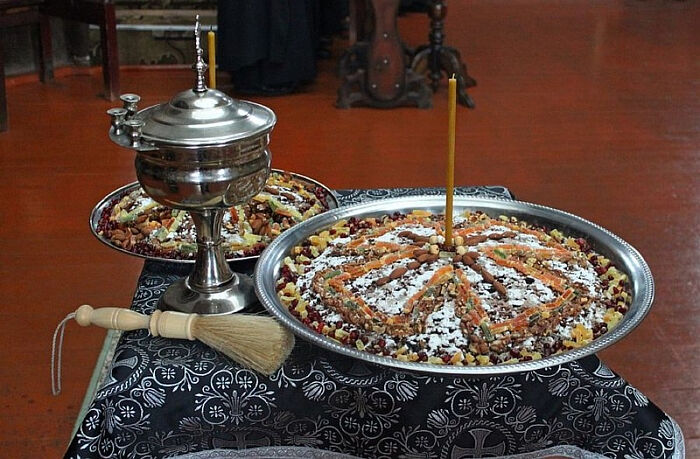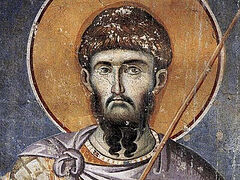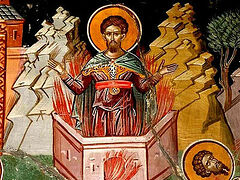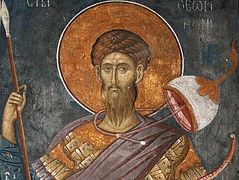In the name of the Father, and of the Son, and of the Holy Spirit! Amen!
On this day the Holy Church established a special commemoration of one of its great-martyrs, Theodore the Tyro. The word “tyro” means “recruit”. Why was St. Theodore called the “Recruit”? Because shortly before his martyrdom for Christ he, fulfilling his civic duty, was conscripted for military service.
At that time the persecution of Christians began again. It turned out that there were Christians among the military squad, including the soldier Theodore. He was an outstanding young man in every way: tall, superbly built, handsome and very intelligent. He was not immediately tortured, at first they kindly suggested that he offer a sacrifice to the pagan gods. It would seem that he was not expected to renounce Christ: he was told just to throw a pinch of incense at the feet of a pagan deity. One could think that St. Theodore would have sacrificed very little— what is so bad about throwing some incense at the feet of a heathen idol? After all, you can continue to believe in Christ.
Similar circumstances sometimes develop in our lives. It seems to us that they do not force us to renounce our God, but having violated His commandment, we are just making a petty deviation from the Law. And, unfortunately, we very often do it. And the holy Great-Martyr Theodore, whose memory the Church is celebrating today, shows us an example of keeping spiritual purity when temptations appear and the enemy wants to spoil our fasting. The saint refused to do what he was asked to do, because he knew that he that is unjust in the least is unjust also in much (Lk. 16:10). According to the practice of that time, St. Theodore was subjected to various tortures. And the torturers finally decided to burn him alive. This is how the holy Great-Martyr Theodore the Tyro suffered for Christ.
The Holy Church honors his memory on February 17 according to the Church calendar. But why does the Holy Church pray to the holy Great-Martyr Theodore the Tyro at the Vespers for Saturday of the First Week of Lent?
The holy great-martyr suffered in about 305–306. Over fifty years later, Julian the Apostate, the nephew of the holy Emperor Constantine the Great, reigned over the Byzantine Empire—a man who had at one time served in church (he was blessed to wear a sticharion) and seemed to believe in Christ. But when he became Emperor, he decided to bring his empire back to idolatry.
Julian was somewhat afraid to fight with Christianity openly. So he decided to commit a malicious evil deed. He called the pagan priests and ordered them to collect the blood of animals after offering sacrifices to idols, and in the First week of Lent, to sprinkle it on all the food sold in the markets. The priests did so, and no one was notified about it. But God is not mocked (Gal. 6:7). On one of the nights of the first week of Lent the holy Great-Martyr Theodore, who had suffered for his faithfulness to Christ, appeared to Archbishop Eudoxius of Constantinople. He warned the Christians about this danger and they stocked up on the necessary food in advance. Thus, Heavenly protection saved the Church of Christ from defilement (as the enemy of mankind had planned), and the Christians preserved their purity.
The question involuntarily arises: would it have been a sin if, unaware that sacrificial blood had been sprinkled on the food, those people had eaten it? Someone may say, “There is no sin in this, because they did not know about it.” But God prevents even sins unknown to man. There is a very important lesson in this story for us: We must always be cautious in our actions and words, and try not to let anything defile our fasting. And Lent exists so that we may understand what we do, what thoughts we have and what words we pronounce.
We bless the koliva with honey or sugar as a symbol that fasting is sweet and the Lenten food that we eat is sweet, because it is with the grace of God. There is a great difference between eating the most humble food with the grace and love of God, as the Wise Solomon says in his Parables, and eating the most luxurious food without love and without the grace of God. This “sweetness” is not just the material sweetness of food created for us by God, the taste of which the Lord takes care of as well. It’s true sweetness, spiritual sweetness.
If you listened attentively to the Old Testament readings at the Divine Liturgy today, then you heard that the first reading from the Book of Genesis reminded us about a terrible and tragic event in the history of mankind—our ancestors’ fall, when Eve and Adam ate fruit from the forbidden tree. Man in the person of Adam and Eve realized that he had renounced God and lost a great deal by violating the commandment. But God did not banish Adam and Eve from the Garden of Eden at once. Adam decided to hide from God—that is, he did a crazy thing, since it is impossible to hide from God. And the Lord God called unto Adam, and said unto him, Where art thou? (Gen. 3:9). God expected Adam to repent. Not only did Adam fail to repent, but he also blamed God and Eve: The woman whom Thou gavest to be with me, she gave me of the tree, and I did eat (Gen. 3:12). Eve should have realized that Adam was doing the wrong thing. She should have fallen at God’s feet and said: “My God! It’s my fault. Forgive me and my husband.” But Eve said, The serpent beguiled me, and I did eat (Gen. 3:13).
How much this resembles our own lives! Remembering Adam and Eve, we can say, “How unreasonable they were! If they had said, ‘Lord, forgive us!’, there would have been no expulsion from Paradise, no death, and to this day we would all have continued to live in Paradise.” It’s easy to condemn our ancestors. But we do exactly the same; we come to confession and judge our neighbor who is “plotting something against us”, our “bad” daughter-in-law, boss, husband, and so on. But repentance should be in sincere contrition: I am alone immensely guilty before my Creator; I do not fulfill His commandments.
Tonight we will come to the sacrament of confession. And first of all, let us condemn ourselves. Let’s try to pull out the root of sin that is in our hearts. Because this thorn of sin defiles me and moves me away from my God. This is what Christ’s Holy Church reminds us about today, so that we can all spend the days of Lent worthily, so that nothing can defile the greatness and holiness of these days, so that this period can be salvific for us. We prayed about this today to the holy Great-Martyr Theodore the Tyro. May God grant that through his prayers and the prayers of all the holy ascetics of faith and piety, the Lord might vouchsafe us to spend the Lenten days worthily, so that this time would be pleasant and saving for us. Amen.





